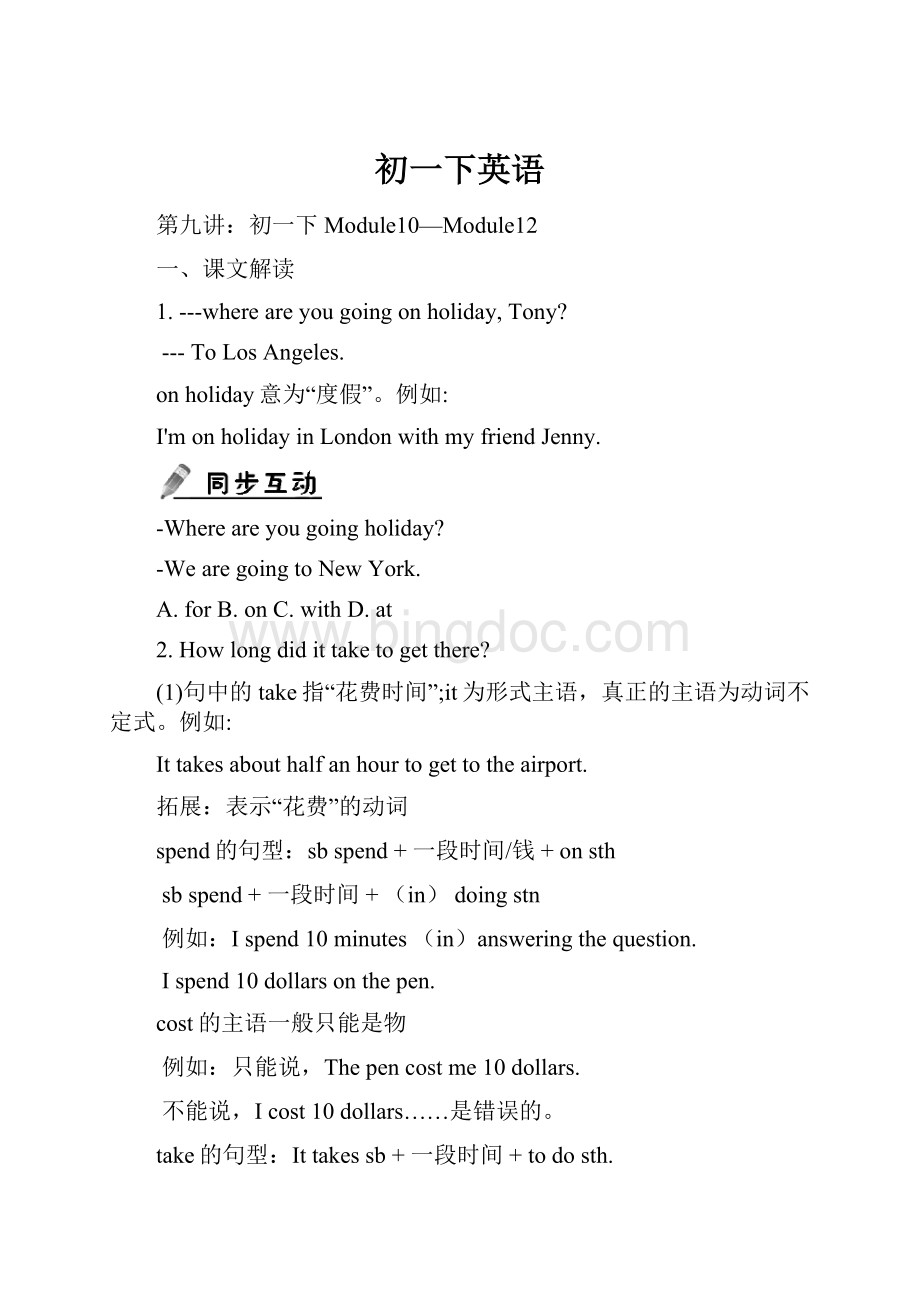初一下英语.docx
《初一下英语.docx》由会员分享,可在线阅读,更多相关《初一下英语.docx(25页珍藏版)》请在冰点文库上搜索。

初一下英语
第九讲:
初一下Module10—Module12
一、课文解读
1.---whereareyougoingonholiday,Tony?
---ToLosAngeles.
onholiday意为“度假”。
例如:
I'monholidayinLondonwithmyfriendJenny.
-Whereareyougoingholiday?
-WearegoingtoNewYork.
A.forB.onC.withD.at
2.Howlongdidittaketogetthere?
(1)句中的take指“花费时间”;it为形式主语,真正的主语为动词不定式。
例如:
Ittakesabouthalfanhourtogettotheairport.
拓展:
表示“花费”的动词
spend的句型:
sbspend+一段时间/钱+onsth
sbspend+一段时间+(in)doingstn
例如:
Ispend10minutes(in)answeringthequestion.
Ispend10dollarsonthepen.
cost的主语一般只能是物
例如:
只能说,Thepencostme10dollars.
不能说,Icost10dollars……是错误的。
take的句型:
Ittakessb+一段时间+todosth.
sthtakesb+一段时间
take作花费讲的时候主语一般也是为物
例如:
Theflightwilltakeme3hours.
pay的句型:
sbpay+钱+forsth
sbpay+钱+tosb
pay的主语一般为人
例如:
Ipaid10dollarstohimforapen
(2)howlong常用来提问时间段或长度,表示“多长时间,
多长”。
例如:
Howlongdoesittaketowalkthere?
1.---didhewatchTVlastnight?
---Foranhour.
A.HowmuchB.HowoftenC.HowlongD.Howsoon
2.Theyspendtoomuchtimethereport
A.writingB.towriteC.onwritingD.write
3.Weweretiredsowerelaxedathomeandbeganourtourofthecityyesterday.
relax是动词,意为“放松”。
例如:
Classicalmusicmakesmerelax.古典音乐令我放松。
拓展relax的派生词有:
relaxingadj.令人放松的多用来修饰事或物
relaxedadj.感到放松的多用来修饰人
例如
Wefeltrelaxedwhenwelistenedtoclassicalmusic.
Whatarelaxingafternoon!
(2)soadj.所以。
在英语表达中,有because就不能有so,也就是说在一个句子中because和so只能
出现一个,和汉语表达不同。
BecauseI'mill,Istayathome.因为我病了,所以我待在家里。
I'mill,soIstayathome.我病了,所以我待在家里
Wefelt(relax)whenIpassedtheexam.
4.Ihopeyoulikeit!
hope是动词,意为“希望”,常见的结构有:
(1)hopetodosth.希望做某事。
例如:
Ihopetohearfromhersoon.我希望很快收到她的来信。
Wehopetoseeyouagain.我们希望能再次见到你。
(2)“主语+hope+that+句子”意为“某人希望……”
例如:
Ihopethatwecanbecomegoodfriends.
我希望我们能成为好朋友。
Theyhope(that)theycancometoChinasomeday.
二TheyhopetocometoChinasomeday.
他们希望有一天能来到中国。
hope之后不可以跟含有动词不定式的复合宾语,但wish可以,wishsb.todosth.表示“希望某人做某事”。
改错
Ihopeyoutostayathometoday.
5.Touristsliketododifferentthingsonholiday.
liketodosth.和likedoingsth.都表示“喜欢做某事”,liketodosth.指暂时性的喜欢,likedoingsth.指经常性的喜欢。
例如:
Theylikeswimming.他们喜欢游泳。
Iliketogooutforawalk我喜欢出去散步。
Myparentsverymuch.Theygototheparktodanceeverynight.
A.likedanceB.likedancingC.liketodance
6.daten.日期
thedateofbirth出生日期
-What'sthedatetoday?
今天是几月几号?
-It'sJune15th.六月十五日。
拓展:
whatdayisittoday?
今天是星期几?
回答要回答星期几而不是几月几号。
---Whattoday?
---It’sMonday.
A.dateisitB.dayisitC.isthedate
7.arrivev.到达
arrive是动词,意为“到达。
。
。
。
。
。
arrivein后接大地点;arriveat后接小地点
例如
WefinallyarrivedinBeijing.
Thebusarrivesatthebusstop.
Hetheparkontime,sohecouldplaywithalittlegirl.
A.arriveatB.arriveinC.get
8.Theysellsuchgoodfruitandvegetables.
suchadj.这样的,那样的,修饰名词:
sucha/an+adj.+名词单数”意为“如此……的……”。
suchabeautifulflower如此美丽的一朵花
拓展
和such类似的一个词是so,它常用来修饰形容词或副词。
sobeautifulaflower如此美丽的一朵花
注意so和such后接名词和形容词时词序不同。
翻译:
Tom是一个如此高的男孩子
【活学活用】
1.Doingmyhomeworkmethreehourslastnight.
A.spentB.tookC.costD.pay
2.---didyoustayinLondon?
---Fortendays.
A.WhenB.HowlongC.HowoftenD.Howsoon
3.Ihopeyoucantheairportontime.
A.getB.reachtoC.arriveatD.arrivein
4.TheyhopetoLondonduringtheOlympicsthissummer
A.togoB.goC.goingD.gone
5.What'sshegoingtodo(度假)?
6.Hehassuchinterestingabook.(改错)
7.Whatisthedaytoday?
(改错)
1.WeChineseoftenshakehandsandsmilewhenwemeetvisitors,andsometimeswenodourheads.
(1)本句结构较为复杂,首先,它是由and连接的并列句,前一个分句中还含有一个时间状语从句,when引导时间状语从句whenwemeetvisitors。
例如:
IalwayssmileathimwhenImeethim.我见到他的时候,总是对他微笑。
(2)shakehands意为“握手”,shakehandswithsb意为“和某人握手”。
例如:
Myparentsstoodupandshookhandswiththeteacher.我爸爸妈妈站起来,和老师握手。
DavidcameintotheroomandIshookhandshim.
A.forB.atC.withD.by
2.InUSAsomepeopleshakehands,andsomekissorhugeachother.
eachother是固定搭配,意为“互相;彼此”。
例如:
Theyhelpedeachotherintheirstudy.他们在学习上互相帮助。
我妈妈要我们互相帮助。
Mymotheraskedustohelp.
3.Ournewforeignstudentsaregoingtoarriveverysoon,andherearesomewaystowelcomethem.
本句是and连接的并列句,前一个分句中的begoingto是一般将来时的结构,后一个分句中,"here十be十名词主语”是倒装句,主语是someways,对应的be动词要用are.
Hereismyfamilyphoto.这是我的全家福照片。
Herearesomeflowersforyou.这儿有一些花送给你。
Here_somewaystolearnEnglish.
A.haveB.hasC.areD.is
4.ButinBritainmanypeopledon’tlikeotherpeopletotouchthematall.
(1)likesb.todosth.意为“喜欢某人做某事”。
Idon'tlikeotherstostandclosetome.我不喜欢别人站得离我很近。
(2)not...atall意为“一点也不;根本不”,表示强烈的否定。
Idon'tlikepopmusicatall.我一点都不喜欢流行音乐。
[拓展」notatall是常见的口语表达,表示“一点也不”,用于道歉场景的答语。
----I'msorrythatIamlateagain.对不起,我又迟到了。
----Notatall没事。
他一点都不喜欢游泳。
Hedoesn'tlikeswimming.
5.insomeplaces,itisn’tpolitetolookatpeoplewhenyoutalk…
本句中含“It's+adj.+todosth.”的句式结构,其中it是形
式主语,真正的主语是其后的动词不定式。
例如:
It'ssadtoknowthenews.得知那则新闻让人觉得很难过。
It'sexcitingtheGreatWall.
A.visitB.visitsC.tovisitD.visiting
6.Childrenandyoungpeoplebowlowerwhentheygreetolderpeople.
本句中的lower是比较级的结构,表示“更低”。
比较级通常以-er结尾。
例如:
Sheisshorterthanhersister.她比她姐姐个子低。
〔拓展〕对于多音节和部分双音节的词来说,比较级要借助于more来构成。
JennyismorebeautifulthanLily.詹妮比莉莉更漂亮。
Mrs.Leeworksthanherhusband.
A.hardB.harderC.hardestD.thehardest
7.hold(held)握住;使不动
Holdmyhat,please.
拓展:
hold的短语
holdon不挂电话
holdone’sbreath屏住呼吸
holdameeting举行会议
他们正在举行会议。
【活学活用】
1.Youshouldshakehandsthembecauseyouarethehost.
A.forB.ofC.asD.with
2.Heresomewaystogreetothers.
A.haveB.hasC.areD.is
3.It'sdifficultformeEnglish.Pleasegivemesomeadvice.
A.learnB.learningC.tolearnD.learns
4.Therearesometreesonsidesofthestreet.
A.eachB.everyC.allD.both
1.WasheGerman?
本句中的German作名词,意为“德国人”。
German的复数形式是Germans,注意不要误写为Germen。
例如:
ImetsomeGermansontheway.我在路上遇到了一些德国人。
German还有“德语”之意,此时German不可数名词。
HecanspeakGermanverywell.
拓展:
国家人变复数总结
ChineseJapanese中国人,日本人单复数同形
Englishman,Frenchman变成Englishmen,Frenchmen
其他国家人按正常规律变
TheycomefromGermanyandtheyare
A.JapaneseB.GermansC.GermenD.Germany
2.Youlistentopopmusic,don’tyou?
这个句子是一个反意疑问句。
反意疑问句由两部分组成,前一部分是对事情的陈述,后一部分是简短的提问。
如果前一部分用肯定形式,后一部分一般用否定形式。
如果前一部分用否定形式,后一部分一般用肯定形式。
例如:
Youareastudent,aren’tyou?
你是一名学生,不是吗?
Wehavegotthetickets,haven’twe?
我们已经得到票了,不是吗?
Shecan'tswim,canshe?
她不会游泳,是吗?
Yoga(瑜伽)helpspeoplekeephealthyandrelaxed,?
A.doesitB.doesn'titC.isitD.isn'tit
3.HisdancemusicmadehimfamousalloverEurope.
本句中的madehimfamous属于makesb.+adj.亦的构成方式,属于形容词作宾语补足语的用法。
例如:
Hisdeathmademesad.他的死让我很难过。
[拓展】make有“使;让”之意,make后可以跟不同形式的宾语补足语。
例如:
makesb.+adj
Makemakesb.+n.
makesb.+dosth.
Whatmakesyousohappy?
什么让你这么高兴?
Wemadehimourmonitor.我们让他当我们的班长。
Thatmakesmefeelbetter.那(件事)使我感觉好多了。
Mymother'shealthmademe
A.feltworriedB.tofeelworriedC.feelingworriedD.feelworried
4.Buthebecomeverypooranddiedin1781whenhewasonly35.
本句中的die作动词,意为“死;去世”。
如:
Mygrandpadiedtwoyearsago.我爷爷两年前去世了。
Theherofiveyearsago.Butheisstillinmanypeople'sheart.
A.diedB.isdiedC.dieD.dies
5.everyyear,theViennaNewYear’sconcerttakesplaceon1stJanuary.
takeplace意为“举行;举办”,可以指会议、婚礼、演唱会等活动的举办等。
例如:
-Whenwilltheweddingtakeplace?
婚礼什么时候举行?
-Nextweek.下星期。
【拓展】takeplace还表示“发生”,常指经过计划或安排的事情发生。
Happen强调事情发生是偶然的例如:
Greatchangeshavetakenplace.发生了许多巨大的变化。
Thecaraccidenthappenedat10:
00.
演唱会通常什么时候举行?
Whendoestheconcertusually.
6.both两个,作定语时,修饰复数名词,常与and连接,意为“既。
。
。
。
。
。
又。
。
。
。
。
。
”两者都。
。
。
。
。
。
。
both与动词连用时,要放在系动词,助动词和情态动词之后,实意动词前。
Bothofthemaregood.
Theybothstudyhard.
辨析both,either,neither
(1)both意为两者都。
both…and…意为…和…都(两者)
Bothhisbrotherandsisteraremarried.
(2)either意为两者中任何一个。
Either…or…意为或者。
。
。
或者。
。
。
;要么。
。
。
要么。
。
。
Ileftiteitheronthetableorinthedrawer.
(3)neither意为两者都不,是both的反义词。
neither…nor…意为。
。
。
和。
。
。
都不
Wearegoingtoplayneitherbasketballnorvolleyball.
Mysistermybrotherarestudents.
A.Neither;norB.Either;orC.Both;and
【活学活用】
1.Therearetoomanystudentsintheclassroomanditistoo.Let'sgoandfindsomewherequiet.
A.noisyB.quietC.seriousD.slow
2.Ourschoolisthecentreofourhometown.
A.atB.forC.inD.on
3.NotonlymysisterbutalsoIcrazyaboutrockmusic.
A.amB.isC.areD.be
4.Themanwasborninandhecouldspeak
A.German;GermanB.Germany;Germany
C.German;GermanyD.Germany;German
4.Hisgrandfatherdiedlastweek.Hefeltcouldn'thelpcrying.
A.happyB.sadC.livelyD.serious
5.Weheartheoftherunningwater.Wefeelrefaxed.
A.noiseB.voiceC.soundD.shout
6.-WouldyouliketobuytheredT-shirtortheyellowone?
一_.Theredoneisformeandtheyellowoneisformysister.
A.EitherB.NeitherC.AllD.Both
二、语法全解
祈使句
祈使句是英语的基本句型之一,表达说话人对对方的叮嘱、劝告、请求或命令等,往往有表示请求、命令、希望、禁止、劝告等意思。
关于祈使句的用法,是这样的:
★祈使句,无主语,原形动词作开始。
祈使句的句子中一般没有主语,而主语you常常省略。
句末用感叹号或句号,肯定结构都以动词原形打头。
朗读时用降调。
Goandasktheteacher.去问问老师。
Comeandmeetmyfamily.来看看我家人。
*Do,Be,Let三种式,委婉请求用“请”字。
祈使句的肯定句式有三种形式,即:
Do型(行为动词原形+副词)
Sitdown!
坐下!
Standup!
起立!
②Be型(Be+表语,如名词、形容词)
Bequiet!
安静!
③Let型(Let+人称代词宾格+动词原形+其它成分)
Letmehelpyou.让我来帮助你。
〔拓展〕为了使祈使句的句式婉转、客气,常加上“请”please。
例如:
Comehere,please.请来这儿。
Pleaselookafteryourlittlesister.请照顾你的妹妹。
根据汉语翻译句子
请认真听我说。
★否定句式很简单,Don、打头记心间。
祈使句的肯定结构是以动词原形打头,否定结构一般是以"Don't+动词原形”打头。
如:
Don'tgothere,please.请别去那儿。
Don'tbelate.不要迟到。
Don'tlethimin.不要让他进来。
[拓展]